
none of the projected tax revenue from taxing sales of recreational marijuana was actually realized by the end of 2023
Source: Joint Legislative Audit and Review Commission (JLARC), Key Considerations for Marijuana Legalization (2020, p.v)

none of the projected tax revenue from taxing sales of recreational marijuana was actually realized by the end of 2023
Source: Joint Legislative Audit and Review Commission (JLARC), Key Considerations for Marijuana Legalization (2020, p.v)
The Virginia General Assembly legalized use of marijuana for medical purposes in 1979, and expanded such use in 2015 and 2018. The laws protected patients from prosecution if they had a recommendation from a doctor that marijuana was medically advised. By the end of 2018, some form of medical marijuana use was legal in 46 states, and broad access to the drug under a doctor's guidance was available in 33 states.
In 2017, a Quinnipiac poll indicated that the 59% of the people in Virginia supported legalizing recreational use, while 35% percent were opposed. After the November, 2018 elections, recreational use had been legalized in the District of Columbia and 10 states, but at that time recreational use was allowed in no state closer to Virginia than Massachusetts.
Decriminalization of possession of up to one ounce in Virginia occurred in 2020. The possession of up to an ounce could be punished only as a civil penalty, similar to a traffic ticket. An ounce could be used to create about 50 joints for smoking.
Actual legalization of marijuana possession for recreational use occurred in 2021, in a compromise that did not authorize sale for recreational use. Possession of up to one ounce was legalized, while a civil penalty could be imposed for possession between one ounce and up to a pound. Possession of over a pound, which indicated a person had stockpiled marijuana for dealing rather than using, remained a felony crime.
In 2022, the legislature backtracked and lowered the threshold for non-criminal possession. Possession of an amount between four ounces and one pound was redefined as a misdemeanor crime, not a civil offense.
The General Assembly did set a schedule in 2021 for authorizing a full-scale commercial system for growing and selling marijuana by the start of 2024. Since sale was not legalized, the legislature approved the right to grow four plants in each house. The Joint Legislative Audit and Review Commission calculated in 2020 that just two plants could accommodate the desires of moderately heavy users for tetrahydrocannabinol (THC):1
In the 2018 legislative session, a bill to decriminalize possession of small amounts of marijuana for recreational use was killed in the Senate Courts of Justice Committee. The vote was clearly partisan. All six Democrats voted in favor, while all nine Republicans opposed decriminalization.2
The political divide reflected the urban-rural divide of Republican and Democratic elected officials, and the different socio-economic character of urban districts represented by Democrats vs. rural districts represented by Republicans. Urban districts had higher percentages of minority voters, and they were arrested for marijuana possession at significantly higher rates than whites.
Virginia has no mechanism for a citizen-initiated referendum, so legalization for recreational use required approval by the General Assembly. Legalization proposals had to be approved first in the Courts of Justice committee of the House of Delegates and the State Senate. Recreational use proposals were blocked in the 2020 session of the General Assembly, which chose to focus instead on decriminalization bills.
In 2020, the legislature ultimately decriminalized possession of up to one ounce of marijuana, hash, or oil concentrates. Those convicted of possession of marijuana had been at risk of 30 days in jail and a $500 fine, while possession of hash or other concentrates was a felony. Efforts by local prosecutors to dismiss all possession cases had been blocked by Virginia judges, who determined such an approach would be an abuse of prosecutorial discretion.
Though recreational marijuana use was not legalized, possession became a civil offense equivalent to a minor traffic violation, with just a $25 penalty. The new law did not eliminate the threat of selective enforcement against minorities based on a law enforcement officer's claim of smelling marijuana before initiating a search, but did eliminate the risk of going to jail for possession of small amounts of marijuana for personal use. In 2018, there had been 29,000 arrests, up from 20,000 in 2008.
In addition to many of the 2018 arrests, charges filed in previous years were also resolved in court cases that year. In 2018, more than 46,000 cases involving marijuana possession were prosecuted in General District Courts across Virginia. In the court system that year, only traffic-related cases exceeded the number of marijuana cases handled.
Some of those cases were not resolved that year, but of the nearly 35,000 cases completed nearly 20,000 people were convicted. African-Americans constituted 19% of the state's population in 2018, but were charged in 49% of the marijuana possession cases and convicted in 51%.
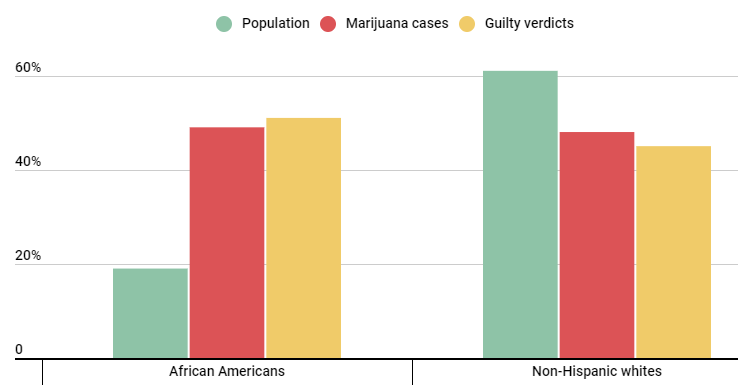
prosecutions and convictions for marijuana possession had a disproportionate impact on the African-American population in 2018
Source: VCU Capital News Service and WWBT, Virginia prosecuted 46,000+ marijuana cases in 2018 (December 12, 2019)
The 2020 legislation was bipartisan. Decriminalization passed in the House of Delegates by 56-36 vote, and in the Senate by 27-12.
One side effect of decriminalization is that K-9 dogs trained to sniff out marijuana became surplus. The dogs had been imprinted to find that one drug, and could not be retrained. If K-9 signaled a law enforcement officer that a car had marijuana but the officer then found guns or other evidence of a felony, then a search based on just a civil crime might be invalidated and the case dismissed. The Virginia State Police retired 13 dogs, and trained new ones to detect Ecstasy (MDMA) cocaine, heroine and methamphetamines.
In Tazewell County, the two trained K-9's were sold to another state where possession had not been decriminalized. Two new dogs were purchased and trained to detect narcotics, and also to track and apprehend people. Cumberland County disbanded its K-9 unit, rather than spend up to $15,000 to acquire and train a new dog.
The sheriff elected in Prince Edward County in 2019 had emphasized in his campaign how he planned to restart the county's K-9 program. The county retired one of its two trained dogs, but donated the other to the Piedmont Regional Jail. Inmates were not allowed to possess cannabis, so searches by trained dogs were still appropriate there.
Though new dogs could be acquired which were not trained to signal their handler when smelling marijuana, early retirement took a toll on the old dogs. One handler who adopted his K-9 described him as suffering initially:3
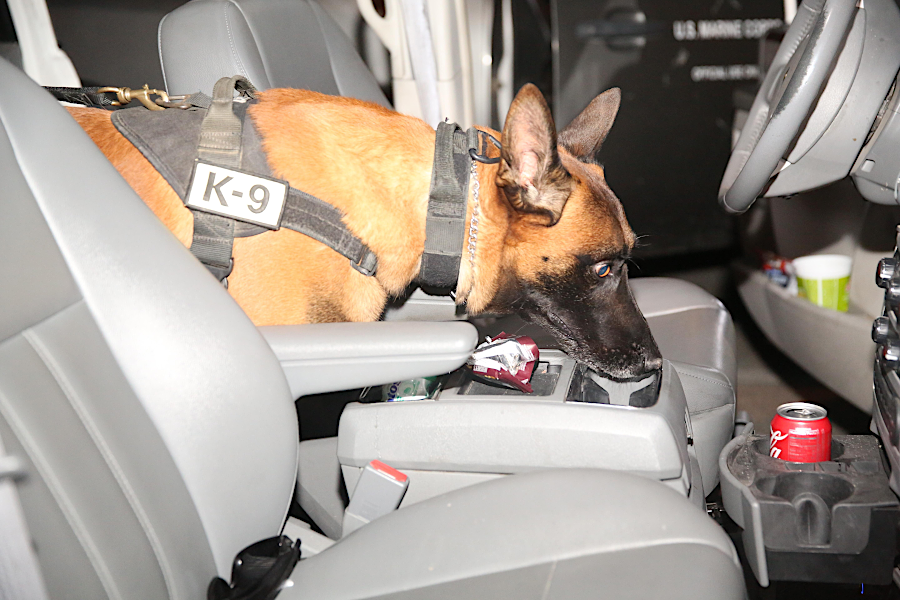
after decriminalization of marijuana in 2020, K-9's trained to spot the drug became surplus
Source: US Marine Corps, PMO K9 division maintains readiness with night training
Decriminalization was expected reduce the racial bias of law enforcement in Virginia. Though the percentage of whites and blacks using marijuana were close, in Virginia between 2010-2019 the arrest rate for possession was 3.5 times higher for blacks.
The Drug Policy Alliance concluded, after examining marijuana-related arrest between 2003-2013, that racial disparity was increasing:4
Statistics on marijuana-related arrests between 2010-2016 revealed a clear distinction based on race. Law enforcement personnel evidently targeted 20% of the state's population more intensely.
There were dramatic differences in the average overall arrest rates between localities. Emporia and Colonial Heights made over 1,500 arrests per 1,000 people living within those jurisdictions, while police in Charlottesville made only 25 arrests/1,000 people. There were 589 arrests/1,000 residents in the City of Fairfax, but the similar City of Falls Church had only 51 arrests/1,000.5
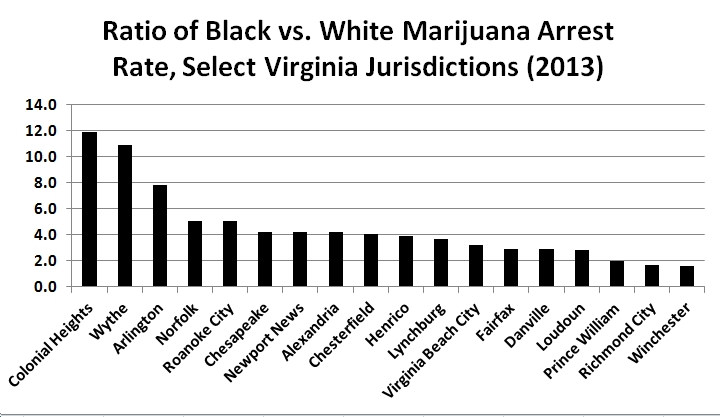
arrest rates vary dramatically by race and by jurisdiction
Source: Blue Virginia blog, New Study: Marijuana Arrests, Racial Disparity in Those Arrests, Increase Sharply in Virginia
The opportunities to create jobs by legalizing recreational marijuana was another incentive for legislative action. Commercial marijuana growing and processing grew rapidly in other states after legalization for recreational use. Virginia legislators saw new tax revenues grow in states that legalized recreational use.
By 2019, there was a widespread assumption that Virginia would be legalizing full recreational use of marijuana soon. In the 2020 election, four more states legalized recreational use, bringing the national total to 15. Members of the General Assembly predicted that the 2021 House of Delegates would authorize recreational use, but passage in the State Senate was not assured. The voting was expected to be bi-partisan, with members of both parties lined up as opponents vs. supporters of legalization.
Governor Northam announced his support for legalizing recreational use two months before the 2021 General Assembly opened. Previously, he had only advocated for decriminalization. He spoke out after release of a report from the Joint Legislative Audit and Review Commission (JLARC) suggested that legalization could generate $300 million in annual sales tax revenue, if the total tax on marijuana (including sales tax) was between 25%-30%.
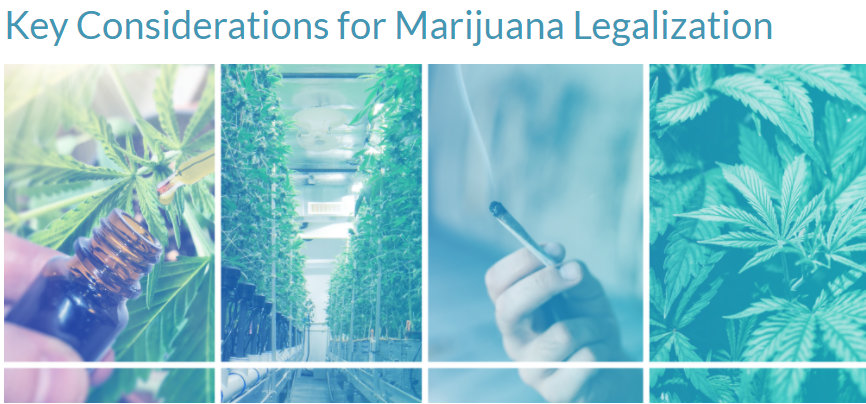
after the Joint Legislative Audit and Review Commission (JLARC) reported on possible tax revenues, Gov. Northam endorsed legalization of recreational use in November 2020
Source: Joint Legislative Audit and Review Commission (JLARC), Key Considerations for Marijuana Legalization
One commentator noted in 2019 that delay in legalization would handicap the future marijuana growers within the state:6
After Federal legalization, many states will try to develop "grow houses," growing and processing marijuana to meet projected demand. Grow houses are energy intensive, requiring 10 times the energy per square foot compared to a typical office building. Two or three grow houses can create the demand equivalent to a data center. Locating a grow house in an existing developed area may require that the electrical grid be modified to accommodate the increased demand, including upgrades to transformers.
Successful grow houses may have to produce cannabis at $300/pound. Energy efficiency could be the factor that determines where the lowest-cost marijuana can be produced. A grow house is an artificial environment, and they may end up being where electrical costs are lowest and not where day length is longest or soil is best.7
Colorado businesses benefitted from "green tourism" after the state legalized recreational use in 2014. State law required growing, processing, and sale within the state's boundaries, but customers could cross state lines and come to Colorado to purchase and use marijuana. In 2017, revenue from cannabis sales exceeded alcohol sales in Aspen. After legalization in California, companies advertised California, "wine and weed" tours.8
Because the Federal government did not legalize recreational use, each state operated as a separate market, an island of opportunity. So many growers in Oregon started legalized businesses that the state ended up with an excess supply. Retail prices dropped 50%, from $14/gram in 2015 to $7/gram in 2017.
The Craft Cannabis Alliance pushed the Oregon legislature to authorize wholesale shipments to other states where marijuana use had been legalized. Oregon growers would benefit from access to a wider market, expanding their customer base. The executive director of the business association complained:9
The Craft Cannabis Alliance in Oregon was anticipating that the US Congress would change Federal law.
So long as marijuana was listed under the Controlled Substances Act as a Schedule I drug, with "high potential for abuse and the potential to create severe psychological and/or physical dependence," growing, processing, selling, and using marijuana was a Federal crime.10
If the US Congress changed the law, however, the state-based barriers to doing business would drop. The competitive position of growers in Colorado, Oregon, and California would be enhanced by expanding the market.
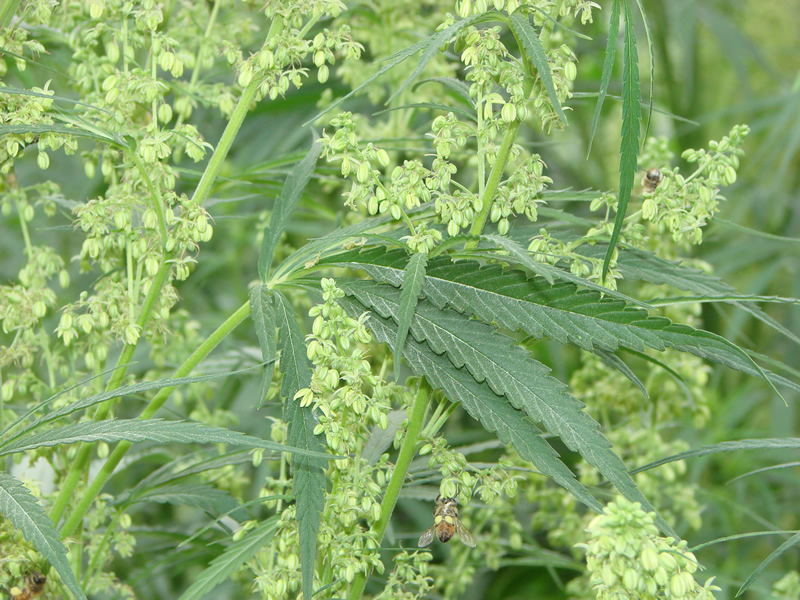
the products from cannabis flowers attract tourists to Colorado
Source: Colorado Department of Agriculture, Industrial Hemp
Because Virginia was not one of the first states to legalize recreational marijuana, growers remained underground and sellers operated in a black market. No Virginia-based strains developed a broad, brand name recognition and no Virginia-based growers developed a broad reputation for a quality product. Virginia ceded the business growth opportunity, because it was "late to market" compared to other states.
The Virginia wine industry has demonstrated the time and effort required to create a market for a locally-grown and locally-processed agricultural product in Virginia. The wine industry required decades to overcome the general public's perception that good wine came from California and Europe, and to get customers to say "make mine Virginia wine."11
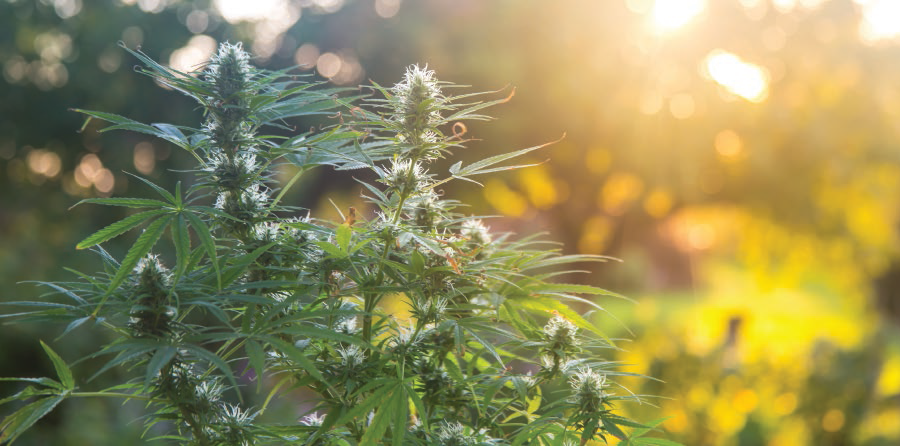
cannabis buds produce the oils, terpenes and other flavoring agents that define the commercially-valuable differences between different strains
Source: State of Colorado, Energy Use in the Colorado Cannabis Industry (p.10)
The banking industry has demonstrated the impact on Virginia corporations when state barriers to commerce are loosened by changes in Federal law. During the deregulation initiatives of the 1980's, Virginia was slow to allow banks to expand with branches, protecting small-town banks from competition with bigger banks based in the urban areas.
North Carolina provided easier opportunities for its banks to expand. They gained experience acquiring and integrating smaller banks into larger corporations. When a 1985 Supreme Court decision liberalized interstate banking, North Carolina banks were better prepared for competition. Virginia banks were swallowed up, and corporate headquarters were moved to Charlotte.12
If the Federal government legalizes recreational marijuana use, then a few large growers are likely to dominate the wholesale market. Just as a few bourbon distilleries are concentrated near the clean water of limestone formations in Kentucky and Tennessee, one region could become the primary center of marijuana production.
Though Colorado legalized recreational use first, the Emerald Triangle of Northern California and Southern Oregon is a top contender for primacy in the marijuana business. Individuals operating outdoor farms and indoor "grow houses" there have learned from decades of experience how to breed specific strains and extract preferred oils from cannabis plants.
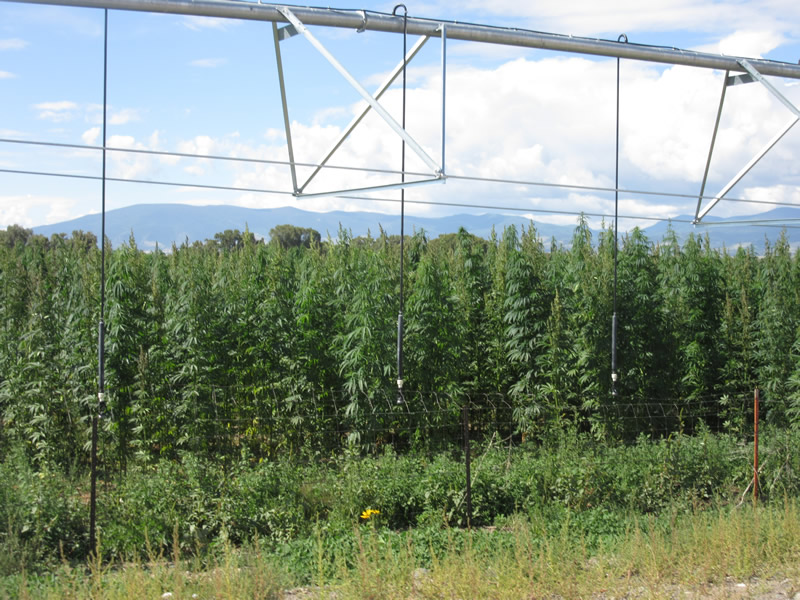
growing industrial hemp outdoors in Colorado includes acquiring water rights for irrigation
Source: Colorado Department of Agriculture, Industrial Hemp
In addition to being a center of practical experience, the Northern California and Southern Oregon region also offers low electricity costs and a mild climate that reduces heating/cooling costs. Grow houses there can be "mixed," with windows opened at suitable times to allow air circulation.
Federal legalization could create a shift in marijuana production that mimics the shift in computer storage and processing to the cloud. When companies first automated their operations in the 1980's and 1990's, they built small computer centers in their local offices. Later, even small companies shifted their data storage and processing to a relatively few data centers, shutting down the small computer centers within the company-owned buildings.
Marijuana growing also started in the 1960's with small, decentralized operations. Fragmenting the farming and processing operations minimized the risk of discovery by law enforcement officials, and minimized the initial investment required by marijuana capitalists to initiate their start-ups.
If legalized, larger and more cost-effective grow houses are likely to replace most of the black market indoor growing operations scattered in garages, basements, barns, and warehouses. Illegal and small facilities may disappear as investors finance larger facilities that benefit from economies of scale.
Legal grow houses will also require extra capital to meet regulatory requirements such as monitoring of pesticide applications, product testing, and security. Since each plant is worth thousands of dollars, theft is a constant risk for marijuana-producing operations. To reassure investors that product will not be diverted, grow operations may implement security that exceeds the requirements established by official laws and regulations.
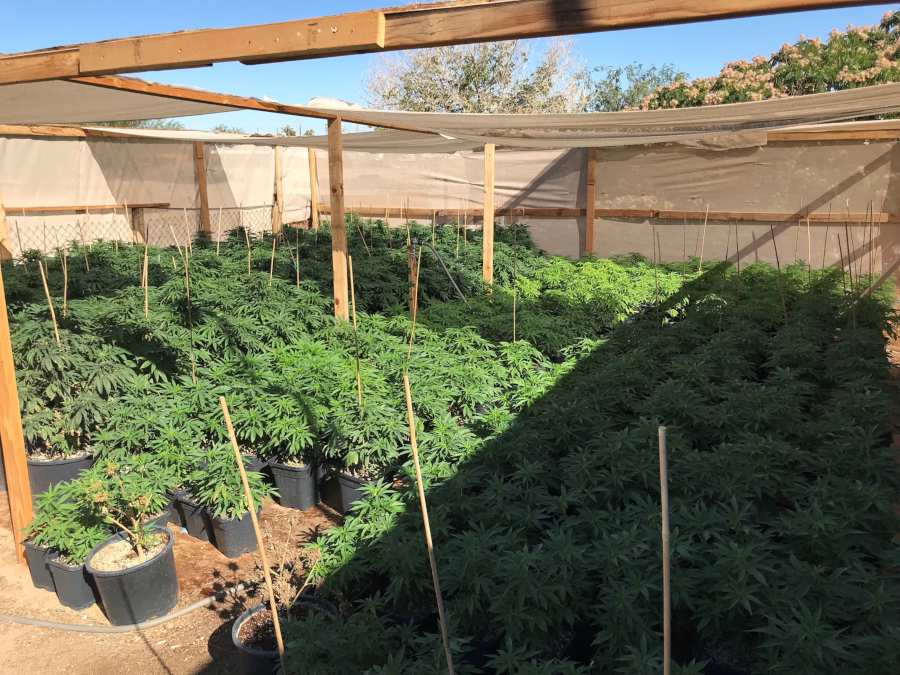
outdoor grow operations require security to prevent theft, and simple screening/fencing is not adequate
Source: San Bernardino Sheriff's Department, Search Warrants - Outdoor Marijuana Grow (Phelan/Pinon Hills, June 21, 2018)
Acreage and electricity requirements of grow houses resemble those of data centers filled with computer servers. Just a few processing plants near centralized grow houses could create the majority of the tetrahydrocannabinol (THC), the primary psychoactive ingredient in marijuana that produces the "high," and the non-psychoactive cannabidiol (CBD) thought to provide health benefits, needed to meet demand of a national and even international market.
Assuming Federal legalization, grow houses that produce the least expensive cannabis-related materials will capture a substantial part of the market. There will be a substantial demand from processors for low-cost cannabis-derived oils that can be infused in edibles and other items. Generic products sold in stores will compete primarily on cost, in contrast to brand name products.
Even branded marijuana products may seek the lowest-cost raw material. Packaging, advertising, celebrity endorsements, and other branding efforts can entice customers to purchase marijuana products without evaluating the source of the marijuana. The marketing of liquor may serve as a model, where companies price and advertise products based on aspects other than the source of the alcohol.
Advertising the health effects of various cannabis-derived products can be done without highlighting the source of the cannabidiol (CBD). For users seeking psychoactive effects, customers may not discriminate based on the specific strain from which the material was produced so long as the percentage of tetrahydrocannabinol (THC) is adequate enough to stimulate the CB1 receptors in the brains.
If Federal law changes and recreational marijuana is treated like alcohol, Virginia growers and processors would still have difficulty competing with Colorado or the Northern California/Southern Oregon region for production within indoor grow houses. Virginia facilities could be located in low-cost areas such as Mecklenburg County, which has already attracted a Microsoft data center. There is less probability of placing grow houses near the data centers in the "Internet Alley" of Loudoun County, due to the high cost of land near the fast internet connections there.
Virginia has a better opportunity to compete in the outdoor grow market for producing items with tetrahydrocannabinol (THC) that will be smoked or incorporated into "gummies." Marijuana plants are affected by the combination of soil, slope, aspect, elevation, and climate, just as grapes for wines are shaped by the terroir in which they grow.
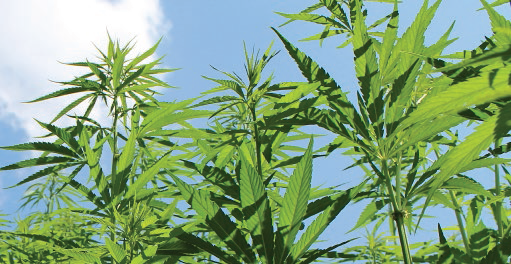
plants from outdoor grow operations are affected more by local soil and climate than plants from indoor grow houses
Source: State of Colorado, Energy Use in the Colorado Cannabis Industry (p.25)
There may be a niche market for marijuana affected by specific geographic factors. Indoor grow operations are affected by location, especially mixed grow houses that open windows and allow local microorganisms to circulate in the air, but site-specific "terroir" factors will have the greatest impact on outdoor marijuana farms.
Genetics is also a key factor. In the 1980's, marijuana had roughly 1.5% THC. Today, there are strains with 30% THC.
Tourists might be enticed to visit places where Virginia-grown products are grown and processed, comparable to wineries. "Cannacultural areas" could be defined, comparable to the viticultural areas created for marketing Virginia wines. If the cannabis equivalent of wine snobs is large enough, Virginia farmers could develop outdoor grow operations and retail outlets despite the competition from outside the state.
Creating what could become a $1.8 billion industry created new economic opportunities. In other states, the business owners in the marijuana industry were 80% white, so Virginia legislators explored how to provide capital or incentives to expand diversity together with legalization. Elected officials also considered the impacts of expunging previous convictions for simple possession, since blacks had 350% greater risk to be convicted that whites.
The 2021 legalization debate in the General Assembly focused on three issues:13
One force driving the legislature to legalization was the availability of recreational marijuana in the District of Columbia, and perhaps soon in Maryland and possibly West Virginia. For decades residents of Virginia had purchased alcohol in the District, where prices were lower, and brought bottles back across the Potomac River. Possession of marijuana without medical authorization remained illegal in Virginia at the start of the 2021 General Assembly, but there would be minimal impacts if a customer brought marijuana from DC into Virginia. In 2020, the legislature had decriminalized possession; those caught would pay just a $25 fine.
As the 2021 General Assembly considered legalization, a commentator noted that the loss of tax revenue would affect their decision:14
The legislators struggled to pass the legalization, including proposals to expunge old criminal records for marijuana possession and to ensure some form of equity in the issuance of licenses. The legislation included a priority for issuing licenses to those who had a conviction for a marijuana-related crime, to people who had graduated from a Historically Black College and University (HBCU) in Virginia.
The General Assembly made a clear commitment to authorize sale of marijuana for recreational use starting in 2024, and the new Virginia Cannabis Control Authority will regulate the new retail marketplace. Fundamental decisions on how to license manufacture and distribution of recreational marijuana were postponed until a future session of the General Assembly. In addition, possession was not legalized. The $25 fine was retained to deter creation of a wide-open market with no oversight for the three years required to establish state-enforced rules.
The delay between legalizing recreational use and establishing legal recreational sales reflected the difficulty in identifying how to prioritizing licenses. In Illinois, the legislature created a lottery system with preferences designed so members of minority communities, women and veterans would win a high percentage of the 500 licenses to be awarded.
Lawsuits delayed the awards in Illinois for two years. While non-traditional applicants had to wait for the lottery process, the state allowed medical marijuana businesses to expand into retail recreational sales. The medical marijuana businesses were primarily white-owned companies, so the social equity goals of the Illinois legislature were not met initially.15
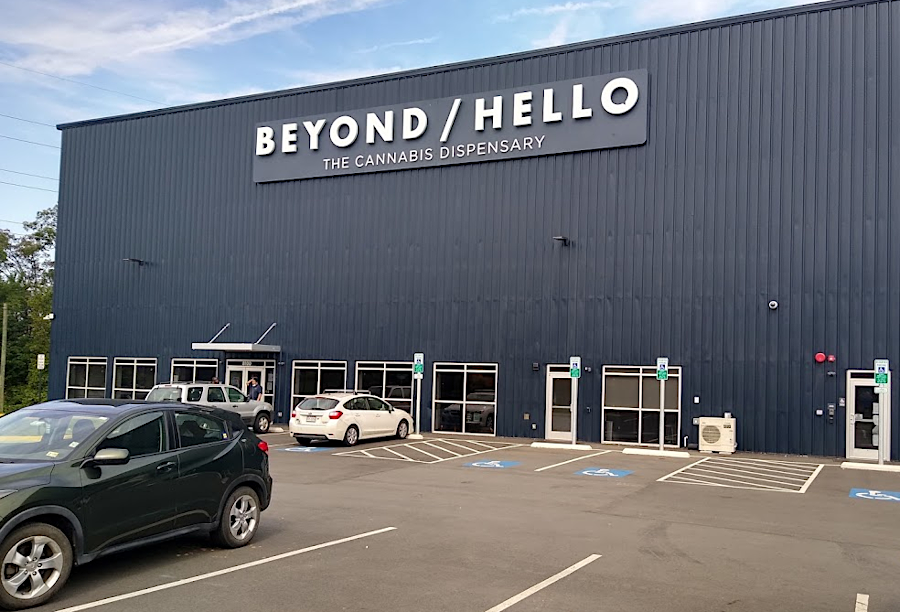
the Northern Virginia growing, processing, and sale facility for medical marijuana in 2021
Delay in full legalization of marijuana for recreational use created opportunities for entrepreneurs willing to exploit regulatory confusion and gaps. The 2018 Farm Bill authorized use of hemp byproducts, limiting use only of hemp products which contained Delta-9-THC. Delta-9 is one of 100 or so cannabinoid compounds produced naturally by the Cannabis sativa plant. The interaction of Delta-9 with chemicals in the human brain is responsible for most of the consciousness-altering "high" effect of marijuana.
Virginia lawmakers omitted limits on use of products with Delta-8-THC, which has a psychoactive effect but was less intoxicating than Delta-9-THC:16
Sellers of the synthetic marijuana exploited the legal loophole, mimicking how "K2" and "spice" were sold until banned by the 2012 Synthetic Drug Abuse Prevention Act.
By 2021, it was common to see shelves at gas stations and various stores selling not just cannabidiol (CBD), but also other marijuana-related products suggesting they would offer a psychoactive effect. Standard hemp buds with less than 0.3% tetrahydrocannabinol (THC) were sprayed with Delta-8-THC, and that byproduct was manufactured into edibles such as gummies and cartridges for vaping.
The Delta-8-THC sprayed on the hemp was not extracted from the plant; natural concentrations were too low. Instead, the chemical was synthesized in a laboratory from cannabidiol (CBD) in an unregulated process. There was no safety data regarding possible byproducts for customers to consider before purchase. A Virginia Commonwealth University professor noted the lack of basic consumer health and safety data for a product that would be taken internally:17
One consumer of a Delta-8 product was surprised by the effect:18
Unlike Virginia, many states which had legalized marijuana for recreational use allowed no loophole for Delta-8-THC products to be sold without state taxation or regulation for quality control, including unsafe additives. A lawyer for the industry claimed they were all byproducts authorized under the 2018 Farm Bill, and were legal even in states which did not allow recreational marijuana sales:19
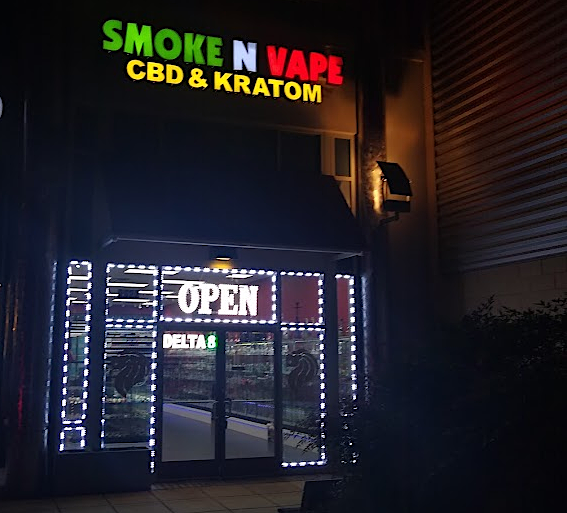
sales outlets and advertising for Delta-8 products were a common sight in Virginia in 2021
That claim ignored the 2020 decision by the Drug Enforcement Administration that synthetically-derived tetrahydrocannabinols were not legalized by the 2018 Farm Bill which authorized production of industrial hemp products. Manufacturing Delta-8-THC required chemical synthesis of cannabidiol (CBD) in a laboratory, so the Federal agency ruling made Delta-8-THC a Schedule I controlled substance. In addition, the Federal Analog Act could also be interpreted to make Delta-8-THC illegal.
By 2021, at least 18 states had banned chemically synthesizing Delta-8-THC products. The authorization was under review in four states, while Delta-8-THC products remained legal in 28 states and the District of Columbia.
Because Virginia failed to clearly ban Delta-8-THC products, they remained readily available in retail stores. Customers could not find a reliable Certificate of Analysis documenting the quality and purity of a CBD product; sales were on a "buyer beware" basis. Because there were no regulations regarding the quality or materials within Delta-8 products, and little understanding of whether synthesis created toxic or harmful byproducts, hospitals struggled to understand how to respond when children ingested Delta-8-THC by accident and suffered negative reactions.
In October 2021, the Attorney General issued a warning about:20
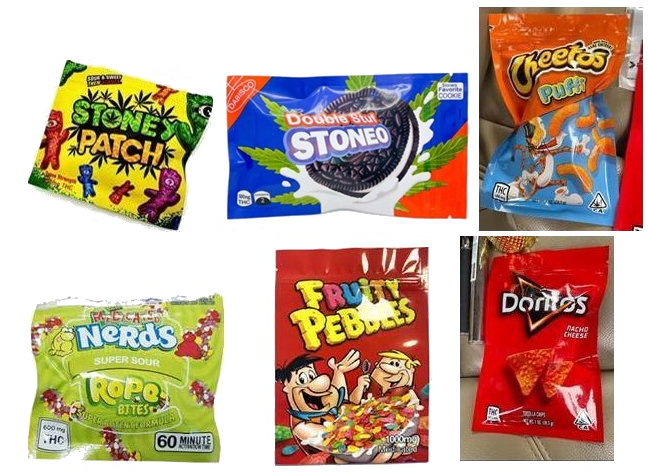
unregulated marijuana was packaged to resemble standard commercial products
Source: Virginia Attorney General, Attorney General Herring Warns Against Unregulated, Illegal Cannabis Products Sold In Look-Alike Packaging
The 2021 debate in the General Assembly to completely legalize marijuana for recreational use was complex. The legislature ultimately legalized possession of no more than one ounce, and retained the low $25 civil penalty for possession of more than an ounce but less than a pound. Up to four marijuana plants could be grown inside a house, but no mechanism was authorized for purchase of marijuana seeds or seedlings or for purchase of up to an ounce of processed marijuana.
Legislators struggled to how the Virginia Cannabis Control Authority should consider social equity when deciding which licenses to grant, and to use licenses to facilitate economic development in areas disproportionately policed for marijuana crimes. Debates concentrated on making it a priority to grant licenses to communities affected by drug crime enforcement, using profits for reparations, exempting cannabis businesses from right-to-work laws, repealing mandatory minimum sentences, and expunging records for past drug convictions. Proposals to schedule resentencing hearings for people already incarcerated on certain marijuana charges were not included in the 2021 legislation.
The final legislation authorized the Virginia Cannabis Control Authority to issue licenses for:
- 400 retail marijuana stores
- 25 marijuana wholesalers
- 60 marijuana manufacturing facilities
- 450 marijuana cultivation facilities
The legislators sought to limit vertical integration to small businesses, in response to concerns that existing industrial hemp processors and medical marijuana growers would have an unfair advantage. Companies licensed by the Board of Pharmacy to grow, process, and sell medical marijuana were authorized to obtain one license to sell marijuana for recreational purposes and to then sell that product at all authorized dispensaries, but only after paying a $1 million fee and submitting a diversity, equity, and inclusion plan to the Cannabis Business Equity and Diversity Support Team.
Key legislators viewed the enforcement of marijuana laws and the "War of Drugs" initiated by President Nixon as a vehicle to punish anti-Vietnam War leftists and people of color. They searched for agreement among a majority of legislators on how to direct benefits from legalization to areas and groups of people which had been disadvantaged by selective law enforcement.

between 2003 - 2014, marijuana possession arrests increased 76% in Virginia while decreasing overall at the national level
Source: Drug Policy Alliance, Racial Disparities in Marijuana Arrests in Virginia (2003-2013) (Figure 1, p.3)
No consensus on the sales process was reached, leading to creation of the Virginia Cannabis Control Authority, Cannabis Public Health Advisory Council and the Cannabis Equity Reinvestment Board to "complete regulations, implement a social equity program, and issue business licenses." The Cannabis Equity Reinvestment Board was given responsibility to manage the Cannabis Equity Reinvestment Fund, using marijuana tax revenues to enhance communities that were disproportionately affected by drug law enforcement.
The disagreements among legislators also led to delay of full legalization until 2024. One legislator concerned about how social equity would be considered when issuing licenses said:21
A Republican legislator from a Southside district flipped the equity argument, which traditionally was advanced by Democratic legislators representing urban areas. He proposed that people living in economically distressed areas be designated as "social equity" applicants. Since most of the economically distressed areas in Virginia were rural counties, that approach would have prioritized a different set of applicants. A story in Cardinal News said:22
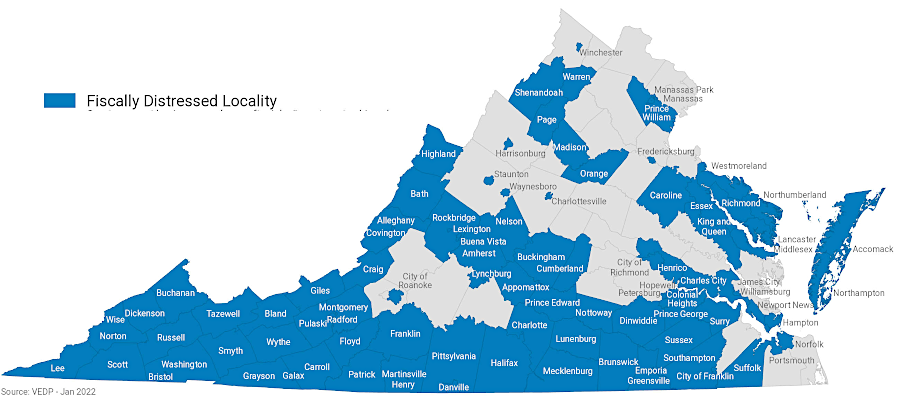
if living in an economically distressed area qualified someone as a social equity applicant, then rural areas would have been prioritized for recreational marijuana licenses
Source: Virginia Economic Development Partnership (VEDP), Virginia Investment Performance Grant (VIP)
Delay gave Virginia officials time to evaluate the different approaches used by Colorado, Washington, California, and other states. The "lessons learned" could help in designing a sales program which met different goals, including addressing the inequities of past enforcement of marijuana laws. The delay also provided time to establish procedures for ensuring market competitiveness for new licensees. If companies with existing licenses to sell medical marijuana were allowed to retail marijuana for recreational use, then the incumbents would have a "head start."
California offered one example of limiting the opportunities to sell legally. The state imposed tight regulations limiting chemical residues in legal marijuana, established high tax rates, and allowed local jurisdictions to block the opening of dispensaries within their city/county boundaries. California ended up with a very small number of legal outlets, selling recreational marijuana at a price so high that the illegal market continued to thrive. Unlicensed outlets openly sold cheaper products, because no cultivation or excise taxes had been paid and state-mandated quality control measures were ignored.
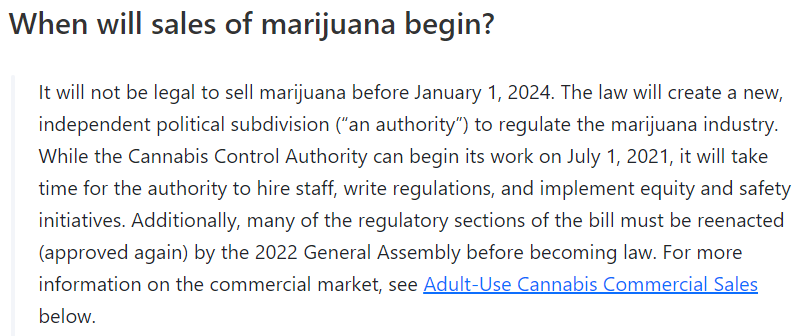
legislators in 2021 delayed full legalization of recreational marijuana, and tasked the Virginia Cannabis Control Authority to propose regulations for commercial sales that would address social equity
Source: Commonwealth of Virginia, Cannabis in Virginia: Frequently Asked Questions (FAQ)
The bill initially approved by the legislators did not authorize possession for recreational use until 2024, so there was the potential for 30 months of arrests for acquiring a product that the state planned to legalize for sale. The governor amended the initial bill to accelerate the legalization date to July 1, 2021, largely in response to concerns about inequity in policing:23
Getting the legalization language adopted involved multiple compromises within the House of Delegates and State Senate. Both houses passed a bill that they recognized as seriously flawed in order to give Governor Northam an opportunity to propose amendments which would resolve remaining differences. Two Republicans in the State Senate dropped their support when hey saw the amendments.
The governor's amendments were adopted on a partisan vote; no Republicans voted in favor. Because one Democrat in the State Senate voted against the governor's proposed changes, the Lieutenant Governor cast a rare tie-breaking vote to adopt the amendments on a 21-20 decision.24
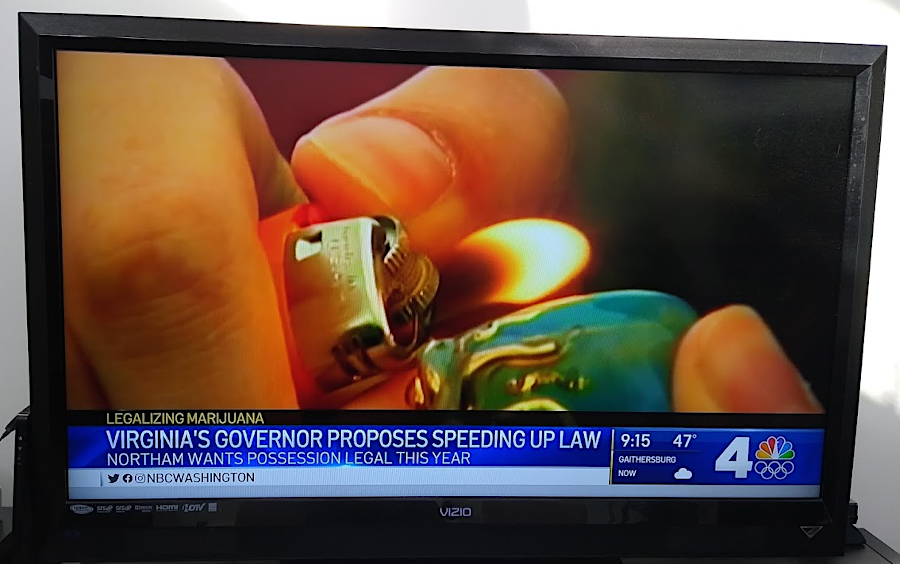
legalization of marijuana possession for recreational use was a major news story in April, 2021
One man invited to witness Governor Northam signing the bill to legalize recreational use was a "marijuana martyr." Back in 1974, Roger Trenton Davis had been sentenced to 40 years for possession of nine ounces of marijuana by a jury in Wythe County Circuit Court. Rolling Stone magazine highlighted his sentence as an example of excessive punishment, noting that the maximum sentence at the time on a conviction for child molestation was just five years. The U.S. Supreme Court upheld the 40-year sentence, but Davis was released on parole in 1984.
Governor Northam's actions and the General Assembly's legislation included provisions for reducing the impact of arrest and conviction for possession and sale of marijuana in the past. Charges for possession were sealed in 2020, reducing the potential for employers to discriminate in hiring. Charges for misdemeanor possession with intent to distribute were sealed in 2021, and the state established a process to petition a court to seal felony records related to marijuana.
The 2021 law still allowed employers to test for marijuana use and discriminate against hiring users, including punishment for those who tested positive. Some companies such as the Virginia Commonwealth University (VCU) Health System dropped their pre-hire drug screening process, but continued to prohibit being under the influence while at work. Tests were likely to reveal tetrahydrocannabinol (THC) even weeks after use, but a positive result could affect job prospects - particularly in businesses with Federal contracts, since the Federal restrictions were not affected by changes in Virginia law. Amazon continued pre-screening for marijuana use only for positions involving the US Department of Transportation, such as delivery drivers.
Chesterfield County decided that even medical marijuana use by employees would remain prohibited, and continued its random drug testing program. When Green Leaf Medical planned in 2022 to remodel a former T-Mobile store and open a dispensary near Chesterfield Towne Center, the county rejected the building permit because medical marijuana use was still illegal on the federal level.
Dominion Resources announced and HCA Healthcare that they planned to maintain their zero-tolerance policy regarding substances banned by the Federal government in the Drug Free Workforce Act, with no exception for marijuana. Even after Altria Group Inc. purchased a company which sold medicinal and recreational cannabis in Canada, it planned to continue post-accident screening of hourly manufacturing employees to help assess if marijuana use was a factor.
Colleges in Virginia continued to ban use of marijuana, fearing that authorization would lead to cuts in Federal funding for violating the Drug-Free Schools and Communities Act. Students could smoke a joint at an off-campus apartment, but not in an on-campus dormitory.
College disciplinary action was legitimate for using marijuana only on college property. Colleges advertising themselves as a drug-free campus could not punish students for possession on a city-owned sidewalk outside a college-owned residence hall. Possession in a city sidewalk was legal, but public use was still illegal. City police could punish students for smoking marijuana on a city sidewalk, since recreational use was legal only in a private setting.
College athletes faced even tighter restrictions. The National Collegiate Athletic Association (NCAA) still arranged for random drug tests, and athletes testing positive for cannabinoids or narcotics lost the right to play for 50% of the season.
In addition, authorization to grow up to four marijuana plants at home did not extend to people living in Federally-subsidized housing. They were still prohibited from growing marijuana, since state legalization had no impact on Federal government regulations. A high percentage of residents in subsidized housing were people of color, so racial discrimination related to marijuana use still continued.25
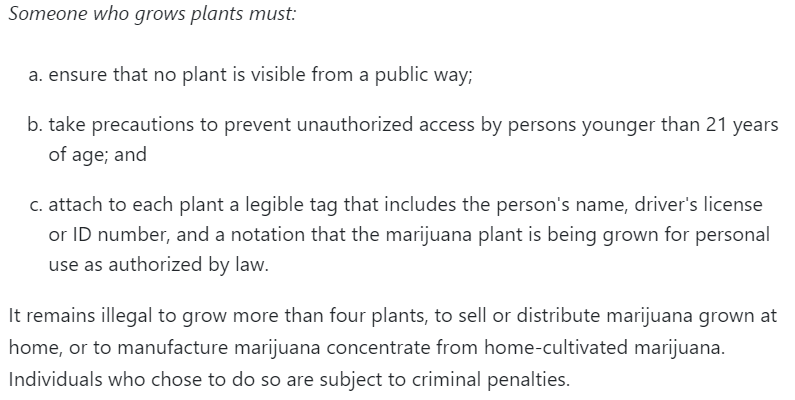
in 2021, the General Assembly legalized growing marijuana at home
Source: Commonwealth of Virginia, Cannabis in Virginia: Frequently Asked Questions (FAQ)
Though sale of marijuana for recreational use would not be legalized until 2024, one business in Winchester planned ahead. Celebrity's Hemp Dispensary opened on June 26, 2021 as a store selling hemp and cannabidiol (CBD) products that were legal. The owner was a state-certified hemp producer and processor, and intended to get licensed to produce products with tetrahydrocannabinol (THC). She was building the business in anticipation of being able to sell recreational marijuana as soon as possible.26
Stores opened across the state to educate and supply home growers. Though the sales of seeds, plants, and marijuana products for recreational use remained banned until 2024, there was a market for hydroponic equipment, grow lights, potting mix, and "how to" guidance. Chains quickly emerged; for example, Happy Trees opened stores in Petersburg, Fredericksburg, and Richmond.
State law limited the number of plants to four within each household, no matter how many people lived there. Plants could be grown only in a primary residence, not in a trailer or second home. Each plant had to have a tag identifying:27
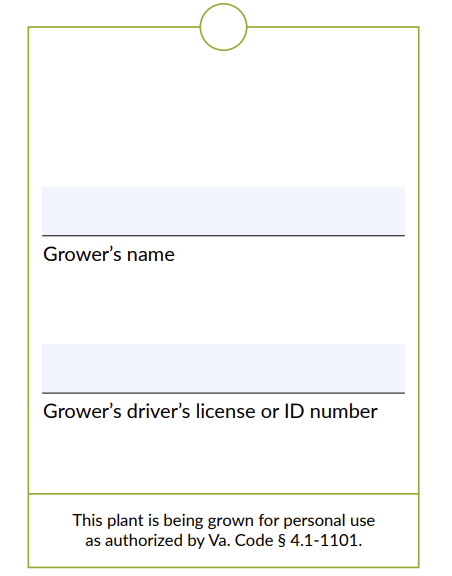
each home-grown plant was required to have an identification tag
Source: Virginia Cannabis Control Authority, Guidance on Home Cultivation

legalization in 2021 authorized each household (not each person) to grow up to four plants, but sale of seeds and plants remained illegal
Source: Virginia Cannabis Control Authority, Guidance on Home Cultivation
Violators of the relaxed constraints on possession were still arrested after July 1. A Chesterfield man was charged with felonies in August, 2021, after the person sharing his house reported he was growing too much marijuana. Police found over 50 marijuana plants plus 1.5 pounds of bagged material that they suspected to be processed marijuana. The grow operation far exceeded the legal number of plants, and possession of a pound or more was still a felony.
Eliminating penalties for possession of one ounce or less of marijuana in 2020 did not reduce the racial disparity in arrests. In the first six months after decriminalization, 4,500 people were charged with possession. Though blacks made up about 20% of the state population, 52% of those arrested during those six months were black.28
The 2021 legislation included a "reenactment clause" requiring a future General Assembly to re-affirm legalization of retail sales of marijuana for recreational use. In the November 2021 elections, the political composition of the legislature changed.
Between 2021-2022, partisan control of the House of Delegates had shifted to the Republican Party. New committee chairs were responsible for guiding legislation that largely mirrored proposals which Democrats had sponsored the previous year except for one key issue. In 2022, proposals to ensure equity blocked full legalization from being enacted. Advocates such as the organization Marijuana Justice sought to shape the new licensing process so members of minority communities, with less access to capital, could compete against the medical marijuana businesses and industrial hemp processors seeking to gain early dominance in the market.
In a House of Delegates subcommittee, the one bill that would have created a retail sales program died on a party-line vote. Advocates noted that illicit sales networks would expand unless a regulated market was established. However, a Republican leader claimed the issues were too complicated to resolve in the 60-day legislative session:29
Democratic delegates who supported legalization in 2022 responded that the 5-3 partisan vote killing the bill would increase illegal sales in school yards and gas stations, rather than advance law and order. By one estimate, Virginia had the fourth-largest illicit market in the United States. One delegate disappointed by the delay commented:30
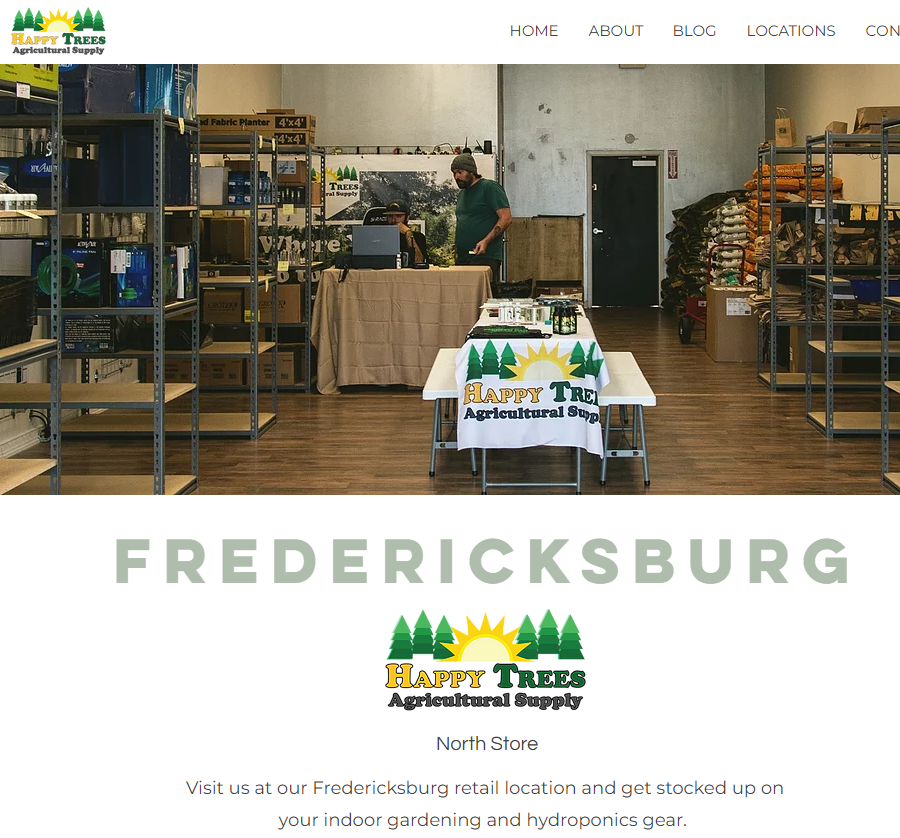
stores to support growing four marijuana plants at home opened in 2021 across Virginia
Source: Happy Trees, About
Both the 2022 and 2023 General Assemblies failed to pass re-enactment legislation that would lead to a legal marketplace for sale of marijuana for recreational use in 2024.
The 2022 General Assembly sought to close the Delta-8-THC loophole created when the US Congress passed the 2018 Farm Bill. The legislature approved SB 591, which redefined "marijuana" to include:31
The 2022 General Assembly did manage to pass a bill to regulate Delta-8 and other synthetic marijuana products. It authorized all synthetic THC products for sale with some regulations and lab-testing requirements, but continued to restrict sale of natural marijuana products not modified in a laboratory. One opponent commented:32
However, the Virginia Department of Agriculture and Consumer Services (VDACS) issued a press release on June 30, 2022 - the day before the new law was to go into effect - announcing that the state agency considered synthetic cannabinoids to be illegal food adulterants, and the Attorney General would require compliance with the Virginia Food and Drink Law. That announcement did not affect sale of smokeable and vapeable versions of Delta-8 and similar synthetic cannabinoids, but threatened all manufacturers of industrial hemp extract with more than 0.3 percent tetrahydrocannabinol (THC) that was intended for human consumption (such as edible gummies):33
The Food and Drug Administration (FDA) disappointed manufacturers of CBD-infused products in 2023 and failed to declare that any would be "generally recognized as safe." The Federal agency announced that it would not approve any products with CBD:34
The legislature also altered recreational marijuana use, acting through the budget process after legislation failed to get approval. Over 90% of the members of the State Senate and 75% of the members of the House of Delegates had supported a ban on making marijuana products as "copycat" edibles which resembled popular snacks. Those products, designed in the shapes of a human, animal, vehicle, or fruit to be attractive to children, were creating a spike in calls to poison response centers. Children who ingested excessive amounts of Delta-8 experienced tachycardia, an excessively rapid heart rate.
However, the governor returned the bill with a proposal to make possession of two ounces up to one pound of marijuana a misdemeanor. This was similar to what the Joint Legislative Audit and Review Commission (JLARC) had recommended in its 2020 study of marijuana legalization. The legislators initially refused to make possession of less than a pound a criminal offense again. The two houses rejected the governor's proposal and killed the popular legislation.
The governor then cut a deal with the three legislators who negotiated with him on reconciling state budget proposals, which were $3 billion apart. The governor amended the budget to re-criminalize possession of four or more ounces up to a pound, making that a Class 3 misdemeanor with a $500 fine. A second conviction would be a Class 2 misdemeanor with a penalty of up to $1,000 fine and possible jail time.
Perhaps an even greater punishment was that a person convicted of a misdemeanor for possessing more than four ounces would have a criminal record. That record would limit their ability to get a job or affordable housing. /p>
The results surprised the other 97 legislators, who were forced to approve the new criminal provision for possession rather than reject the entire budget. Time pressure was tight; the deal was announced just 30 days before the start of the next fiscal year.35
Since four plants could produce as much as a pound of marijuana, the 2022 change in the law created a risk that someone legally growing four plants at home could be arrested and convicted of a misdemeanor. One solution for home growers would be to put seeds into pots at different times and harvest one plant every three months, so the product would be used up before the next harvest.
The failure to establish a legal framework for sale of recreational marijuana resulted in a marketplace where entrepreneurs took risks to sell the product through various mechanisms that may, or may not, have qualified as legal. Some cannabis companies represented themselves as private social clubs and sold buds and rosin, while other entrepreneurs opened businesses that sold grow lights, training, and perhaps other items not fully advertised. As one businessman willing to test the boundaries of Virginia law commented:36
While Virginia postponed legitimizing the sale of recreational marijuana, companies struggled to make a profit in other states where such sales were already legal. Federal tax law blocked the companies from deducting business expenses, while other Federal laws increased production costs by banning the transport of recreational marijuana across state lines. Limits on access to financial services made it hard to borrow money needed to build growhouses, distribution networks, and retail outlets.
If the US Congress legalized recreational marijuana, companies that had invested in expensive indoor growhouses in order to provide an in-state source of marijuana may find those facilities to be stranded assets. Warm-weather states offer lower-cost options for growing marijuana outdoors, without expensive electricity for grow lights. In 2021, nearly 90% of legal marijuana was grown exclusively or partially indoors.
However, quality and security could be controlled more closely with indoor operations. Pests could be managed and thieves deterred by indoor farming.
One entrepreneur emphasized in 2022:37
By the end of 2022, 19 states were taxing cannabis sales. The law of supply and demand was affecting tax revenue generated from cannabis sales in states where recreational sales were established first. A surplus of marijuana forced 30-50% declines in the price in some states. In California, Nevada, Oregon, Washington and California, tax revenues dropped between 3-14% after rising steadily since the first legalization in 2015.38
As a result of the partial legalization in Virginia, arrests for recreational marijuana dropped 90% between 2019-2022. However, the traditional racial disparity remained for those arrested for the still-illegal sale of recreational marijuana. In a state in which only 20% of the population was black, 60% of the marijuana-related arrests were black adults.
The Washington Post noted that while the ratio of white/black arrests remained unbalanced, but the total had dropped dramatically:39
The number of vape shops expanded after 2021, and stores selling CBD-related items become a common feature in shopping strips. Some stores reportedly were also selling recreational marijuana, creating a public but illicit market. Other stores suggested that customers already had traditional supply networks or grew plants at home, and did not need to purchase "weed."
The ready availability of marijuana and vaping technology may have been a factor in the decline of smoking tobacco. Cigarette smoking in the United States dropped from 21% in 2005 to 11.5% in 2023.40
The failure of the Virginia General Assembly to create an effective, consumer-focused legal marketplace for buying marijuana for recreational use left the state at risk of repeating the experience in California and New York. In both states, legalization did not disrupt the illegal market. Anticipated benefits, including increased tax revenue and healthier products, did not materialize because state regulations did not create a legal process for buying marijuana that was better for customers.
In 2023, the California Department of Cannabis Control identified 354 legal retail shops in Los Angeles but estimated there were 700-1,000 additional unlicensed shops and delivery services. Delivery services were in demand in local jurisdictions which had prohibited retail marijuana sales outlets.
High taxes incentivized continued illicit distribution. Local prohibition of retail sales outlets in over 60% of California's cities and counties maintained market demand for illegal marijuana in those areas. As described by the Wall Street Journal:41
The challenge of legally purchasing seeds to grow four plants per household was addressed by a nursery in Culpeper County. The Culpeper Hemp Company concluded that the seeds tested under the 0.3% THC threshold, and therefore could be sold legally as a hemp product.
As an indicator how public attitudes had changed regarding recreational marijuana use, the Culpeper Chamber of Commerce held a ribbon cutting for the new business when it opened in June, 2023.42
By 2023, even though marijuana was still on the Federal list of Schedule I banned substances along with heroin and peyote, 11 states were collecting $3 billion annually in taxes from the sale of marijuana for recreational use. Virginia and four other states had passed legislation authorizing a tax on cannabis, but had not established a retail sales program which would enable collection of the tax.
In the vacuum, illegal marijuana delivery services sold marijuana openly. One company that analyzed cannabis consumption estimated that total sales of marijuana in Virginia would be $2.4 billion in 2023, and 99% would be for recreational use by unlicensed, untaxed, and unregulated entrepreneurs. Customers could use an encrypted app and an Instagram account to place an order, paying in cash or via online tools such as CashApp.
As described by the Richmond Times-Dispatch:43
A study by the Joint Legislative Audit & Review Commission (JLARC) in 2020 had projected that Virginia could generate up to $300 million annually from taxes, once sale of marijuana for recreational use was legalized. The recreational market could generate as much as $2.4 billion in sales. By the end of 2023, however, the state had generated zero revenue because no legal framework for such sales had been created by the General Assembly.
In the 2023 General Assembly, the Republican-controlled House of Delegates blocked legalizing sales and cut funding for the Cannabis Control Authority by $2.9 million to $5.3 million.
After the 2024 elections, Democrats controlled both houses of the General Assembly. The Governor was still a Republican who had said he was "not interested" in legalizing sale of marijuana for recreational use. In the words of a former Republican member of the House of Delegates who became a lobbyist for the Virginia Cannabis Association:44
The state of Maryland quickly took advantage of Virginia's inability to create a legal market for the production and sale of recreational marijuana. Maryland's legislature authorized adult-use cannabis sales in April 2023. State officials estimated that Maryland would collect $54 million in revenue from the first year of licensing fees and taxes.
Maryland agencies had the regulatory framework in place for the first legal sales at the 100 existing medical marijuana outlets on July 1, 2023. To meet expected demand, 300 dispensaries would need to be licensed. Maryland officials planned to start issuing new licenses for the recreational market in January 2024. The sequence gave the medical marijuana industry a commercial head start, but the fast authorization of legal sale outlets was intended to minimize any surge of illicit sellers.
An official at one of the licensed medical marijuana companies noted the advantage of being first to market:45
The medical marijuana companies faced unusual business risks. As the licensed provider in Northern Virginia, Jushi controlled all medical marijuana sales in that wealthy, heavily-populated region from its six legal dispensaries. The upside potential was high, so Jushi invested in a major expansion in anticipation of legal marijuana sales. It spent $22 million to buy land to expand its grow/process/sell facility near Manassas with a 65,000 square foot addition.
However, investors decided in 2023 that the company was not likely to be very profitable in the short run. Federal legalization for recreational use appeared unlikely, Virginia officials had failed to define a path for state-authorized recreational sales - and after July 1, 2023, Virginia buyers could drive to nearby Maryland as well as to the District of Columbia for legal purchases.
Jushi stock, sold over the counter n he United States and on the Canadian Securities Exchange, lost 80% of its value and dropped to $0.49/share. Subcontractors expanding the Manassas facility filed mechanics liens after Jushi failed to make payments.46

the Culpeper Hemp Company priced seeds to grow four plants per household between $35-70 in 2023
Source: Culpeper Hemp Company, Shop
The company anticipated that its $100 million investment in the Northern Virginia facility would justify a $50 million expansion once the General Assembly authorized sales for recreational use. By 2024 Jushi was already seeing 300-500 medical customers daily, generating $50,000 in revenue. By getting county permits to add a 65,000 square foot expansion to the existing 96,000 square foot facility, Jushi was betting that recreational sales would reward investors.
The Chief Strategy Director said:47
The 2024 General Assembly resolved multiple policy issues, such as the tax rate for cannabis products, as it developed legislation to create a regulated market for the commercial sale of marijuana for recreational use. One decision was to drop proposals to authorize medical marijuana producers to sell for recreational use six months before anyone else. To address equity concerns, the Cannabis Control Authority was directed to use a new Virginia Cannabis Equity Business Loan Fund, financed by taxes on sales of recreational cannabis products. The fund would support creation of small businesses in minority communities historically impacted by enforcement of laws against marijuana use.
The House General Laws Committee passed a compromise on February 22, 2024. The 12-10 vote was a partisan decision, with all Republicans opposing the bill and all Democrats voting in favor. A lobbyist supporting the legislation, a former Republican member of the House of Delegates, urged his colleagues to support the compromise that he had helped to draft:48
Governor Youngkin vetoed the bill that would have legalized retail sale of marijuana for recreational use, saying:49
Legalization of a retail market was viewed as inevitable, but timing mattered. The founder of Purely Appalachia, which hoped to develop business opportunities related to agricultural hemp and recreational marijuana, commented in 2024 after the veto:50
 Virginia laws regarding "gifting/sharing" were vague enough for retail stores to claim they were not "selling" marijuana
Virginia laws regarding "gifting/sharing" were vague enough for retail stores to claim they were not "selling" marijuana
Source: Virginia Cannabis Control Authority, Adult Sharing vs. Illegal Exchanges: What's the Difference?
By comparison, Maryland took a different approach than Virginia. Maryland's General Assembly authorized sale of recreational marijuana by all existing medical marijuana dispensaries, creating a legal market with a large number of sales outlets starting July 1, 2023. The first month showed almost a 100% increase in legal cannabis sales, from $43 million in July 2022 to $84 million in July 2023.51
The confusion regarding what was legal and the low priority placed on enforcement enabled entrepreneurs to open stores where marijuana was distributed as rolled cigarettes and in other forms, with transactions represented as "sharing" or "gifting" rather than as "purchasing." By September 2023, there were 10 The Good Vibes "pop up" shops in Abingdon, Blacksburg, Bluefield, Bristol, Marion, Radford, Roanoke County and Wytheville.
According to the law, it was legal for adults at least 21 years old to share one ounce or less of marijuana, so long as the transfer was done privately. In the pop up marijuana shops, legal sales of different commodities were followed by, according to the participants, a "sharing" done voluntarily between two adults.
Law enforcement officials in 2023 described the marijuana distribution process as a "Wild West" of unregulated behavior. A drug bust in Russell County was a rare event. Three people were arrested at the "Let's Grow" store in Lebanon. Action by the county sheriff and Virginia State Police may have been triggered because the store was close to Lebanon High School, and the transaction process was blatant selling of marijuana.
A representative of the Virginia Cannabis Association said:52
One hemp farmer, struggling to stay in business until the state legalized sale of marijuana for recreational use, responded to claims that authorized sales would not eliminate criminal behavior:53
The disconnect between legal possession and illegal sales left Virginia at the end of 2024 as:54
Source: 13NewsNow, Seed to Sale Part 1: Hemp farmers split on future of the crop in Virginia
Source: 13NewsNow, Seed To Sale Part 2: "Hemp is dead in Virginia. Cannabis is dead in Virginia."
Failure to authorize sale of recreational marijuana meant Virginia could not enforce safety standards for unregulated and untested products. Without any state inspection process, there were no limits on pesticides, bacterial, or mold in cannabis products with excessive levels of THC.
In addition, the state could not tax the most valuable agricultural product being sold in the state. In 2024, Maryland was collecting approximately $60 million/year from adult-use cannabis sales tax revenue, after setting a 9% tax rate.
The broiler chicken industry generated $1.6 billion in sales each year, but marijuana sales were estimated at $2-3 billion annually. By 2022 more people were using marijuana than alcohol, a source of significant tax revenue for Virginia. The editor of Cardinal News predicted after the 2024 General Assembly that legal retail sales of marijuana for recreational use was still several years in the future:55
While the General Assembly was unable to pass legislation to establish a legal retail system, entrepreneurs chose to sell marijuana for adult recreational use under various guises. Some stores styled themselves as adult share businesses and in theory "gifted" marijuana to customers who bought another product. Prices for legal products were excessively high, but customers were really buying the "gift." Other stores claimed to be private clubs, selling only to members. That technique had been used for selling liquor by the drink before that was legalized in 1968.
According to an opinion issued by the Attorney General on April 20, 2023, marijuana distribution through gifting or private clubs was not a legal form of adult sharing. Commercial transactions, with payment for marijuana, were against the law.
Federal, state and local law enforcement agencies conducted a series of raids on September 28, 2023 on over 20 stores in Southwest Virginia. Officials seized ATMs, cash, computers and cellphones, plus marijuana products. By the following August, what state police called an "extensive, ongoing criminal investigation into allegations of money laundering and illegal narcotic distribution network by retail establishments" had led to just once court case being filed in Scott County. State and local officials were reluctant to invest public safety resources in closing down small business operations that would reappear soon afterwards, perhaps even with the same name.
By April 2025, a dozen people had been charged with possession of marijuana and conspiracy to distribute marijuana. Of the court cases completed, one person received a sentence of a year in jail. Eight were given suspended sentences or charges were dropped.
Weber City in Scott County became a hub of shops providing free marijuana as a "gift" after customers purchased another item, such as a decal. Four different retail establishments were located within just a few miles of the Tennessee border, and based on their state license plates most customers had crossed the border to shop in Virginia. The retail purchase of marijuana for recreational use was illegal in both states, but Virginia permitted stores to provide it as a supposedly free gift when purchasers paid a high price for another relatively valueless item.
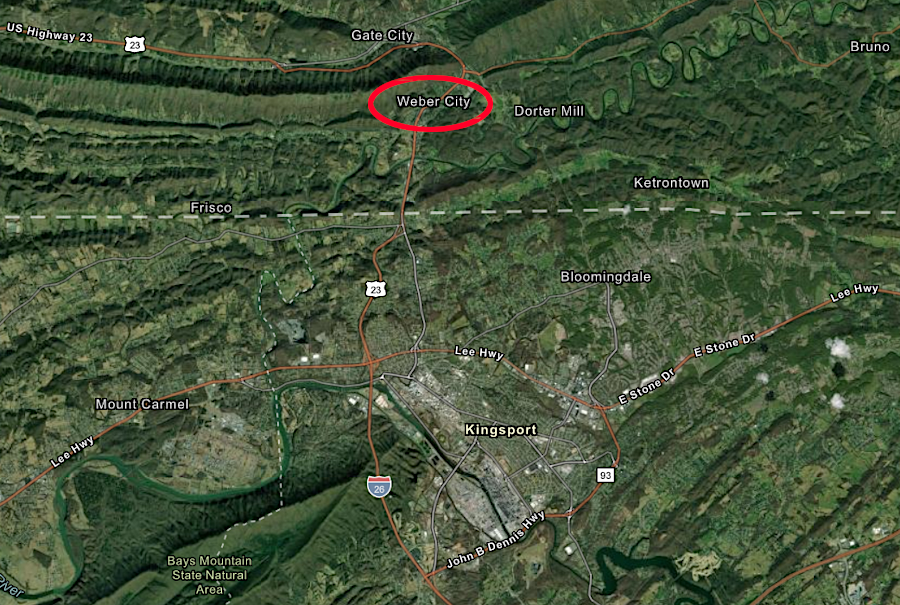 lack of enforcement of laws against selling recreational marijuana encouraged Tennessee customers to shop in Weber City
lack of enforcement of laws against selling recreational marijuana encouraged Tennessee customers to shop in Weber City
Source: ESRI, ArcGIS Online
The convenience store in the Exxon station across the street from the Franklin County Sheriff's Office at Smith Mountain Lake openly sold packages of "TCH-A flower" in 2024. Two 3.5-gram packets, produced by Life Healing Hemp, were priced at $29.99 plus tax. There was a QR code on the back of the packages purporting to link to a Certificate of Analysis as required by Virginia law for edible hemp products, but the links were bogus.
The back of the package said "2018 Farm Bill Compliant Legal Hemp Product. This product is not Marijuana." That 2018 Federal law had authorized sale of hemp so long as it did not exceed 0.3% THC, and included no limits on tetrahydrocannabinolic acid (THCA). THCA produces no intoxicating effect, but is easily converted into THC by heating. The General Assembly set a threshold of 0.3% for THCA as well as THC when it legalized recreational use of marijuana, so products with high levels of THCA that would be legal for sale under Federal law were illegal under Virginia law.
Packages sold at the convenience store had THC levels of 3.11% and TCHA levels of 26.58%. After the THCA would be converted to THC by smoking, the level of intoxicating THC would be 26.51% - far above the 0.3% legal threshold. The marijuana also had excessively high levels of mold and bacteria that could trigger lung problems.
A representative for Virginia Cannabis Association proposed a mechanism for eliminating illegal sales in public stores:56
The companies with licenses for medical marijuana were aware that the gifting/membership entrepreneurs were establishing a retail presence and brand names in advance of eventual General Assembly legalization. Their market share could affect the future profits of the medical marijuana companies when they expanded into legal recreational sales. Governor Youngkin vetoed a legalization bill in 2024 and was not expected to support sale of marijuana for recreational use in 2025, so large corporations interested in establishing their brands were forced to watch small operators get established with impunity.
The chief strategy director for Jushi, which sold medical marijuana legally in Northern Virginia, expressed frustration after the end of the 2024 General Assembly session:57
The Virginia Cannabis Association was disappointed by Gov. Youngkin's 2024 veto of the bill to create a legal retail market. A lobbyist for that organization said before the 2025 General Assembly started:58
There was some enforcement of the prohibition against retail sale of marijuana for recreational use. In 2024 Louisa County obtained a criminal conviction against the owner of a Higher Education store for openly selling psychedelic mushroom products and marijuana. The store hosted pop-up shops on a weekly basis, in the style of a farmers market. The Louisa County Commonwealth's Attorney said:59
The owner faced up to 160 years of jail time. The Virginia Hemp Coalition offered a very different perspective on the case:60
Richmond officials declared in 2025 that most of the 87 vape shops in town were selling marijuana products. The city prohibited opening a new vape shop, but those already in operation were "grandfathered" and allowed to continue in business. The shops were blamed for an increase in commercial robberies, with guns being used 88% of the time as robbers raided a vape store.61
In the 2025 General Assembly, Governor Youngkin continued to oppose creating a legal process for the purchase of recreational marijuana. For the second year in a row, he vetoed a bill that would have established the framework for legal sales, with the state receiving an estimated $300 million annually in tax revenue. The Virginia Cannabis Control Authority would have issued licenses so sales could start by May 2026.
His fundamental problem was with the legalization decision by the General Assembly in 2020. As governor he could not force the legislature to change that decision, but he could use his Executive Branch powers and block implementation. The veto message included:62
He did support a bill to have the Safety and Health Codes Board define a tetrahydrocannabinol (THC) impairment standard for manufacturing and utility workers.
The proposal was an alternative to companies adopting a zero tolerance policy, and would allow for marijuana use away from job sites so long as the effects were within an acceptable level once someone came to work.
The bill was rejected on a party-line vote. Democrats were opposed largely because there was no commonly-accepted standard for when someone was "impaired." Marijuana metabolizes in a human body differently from alcohol. For the same reason, the Crime Commission in 2022 had decided not to recommend a level of tetrahydrocannabinol for determining if someone was guilty of impaired driving. The attempted approach was modeled after how alcohol use was regulated with an easy-to-measure .08% blood level.
The opponents of the bill quoted the director of the National Institute on Drug Abuse:63
Once legalized, most marijuana was expected to be grown indoors. Electricity, equipment for lighting, and other costs require a significant up-front investment in greenhouses, but farmers can control conditions and produce a higher-quality crop. A major return on investment is that indoor growing (with 12 hours a day of artificial light) can generate about six harvests annually compared to one-two harvests per year for outdoor growing.
Providing electricity to indoor growhouses was expected to be a challenge. By 2024, nationwide the cannabis industry was growing 24,000 metric tons annually. If all of the marijuana was processed into joints, that was enough for each adult American to have 90 joints. The electricity required to power growhouses was 1% of all American energy.64
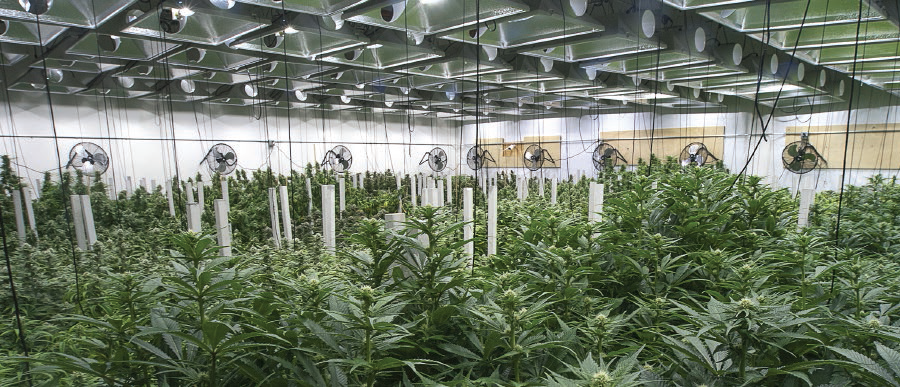
electricity cost is a major factor in the location of indoor grow houses, in states where recreational marijuana is legal
Source: State of Colorado, Energy Use in the Colorado Cannabis Industry (p.8)
After the election of Democratic candidate Abigail Spanberger as governor in November 2025 and expansion of the party's control of the House of Delegates, the Joint Commission on the Future of Cannabis Sales refined plans for the 2026 General Assembly to create a legal marrket for recreational sales. Spanberger had said in her campaign:65
One key legislator said the delay had given organized crime time to establish a "stranglehold" on the retail market for recreational use. A swift launch was desired, but the legislators also wanted to ensure small businesses could have an opportunity to compete with major corporations in the marijuana business. That was expected to enhance equity, particularly in communities where enforcement of marijuana laws had been most intense.
If sales were legalized immediately, then the four companies in operation with medical marijuana licenses and existing dispensary sale outlets would have an advantage in capturing the recreational market as a regulated retail market replaced the illicit market. A launch date of January 1, 2027 was anticipated.
However, the Joint Commission on the Future of Cannabis Sales proposed accelerating that date when it completed its final meeting in December 2025. The commission proposed that 100 "microbusinesses" be issued a license in September 2026, with full retail operations starting later on November 1. The early licenses were intended to help small businesses get a foothold in the market before large corporations. The 100 licenses would prioritize businesses which met certain criteria for being impacted in the past by the criminalization of marijuana use.66
Federal action in November 2025 also impacted the planned recreational sales landscape. The US Congress modified the 2018 Farm Bill to eliminate sale of Delta-8 products, nullifying state laws which allowed sale of intoxicating hemp-based or hemp-derived products. The new Federal law would impact gummies, drinks such as THC-infused cocktails, and vapes where THC derived from agricultural hemp had been concentrated enough to be intoxicating. Sale of THC-infused body creams used by customers with skin ailments were also threatened.
As described by Sen. Mitch McConnell:67
Sen. Rand Paul opposed the new legislation, scheduled to go into effect in November 2026. He warned:68
On December 18, 2025 President Trump issued an executive order to change the legal landscape. He directed the Drug Enforcement Administration (DEA) to complete the process for reclassifying marijuana from a Class I to a Class III drug according to the Controlled Substances Act. The Biden Administration had started the reclassification process, but the Drug Enforcement Administration (DEA) did not hold a public hearing before President Trump was inaugurated for the second time.
Schedule I drugs included those with no currently accepted medical use and a high potential for abuse such as heroin, lysergic acid diethylamide (LSD), 3,4-methylenedioxymethamphetamine (ecstasy), methaqualone, and peyote. Schedule III drugs had lower potential for physical and psychological dependence and potential medical benefits, sych as Tylenol with codeine, ketamine, anabolic steroids, and testosterone.
By the end of 2025, there wer4 40 states (plus the District of Columbia) with medical marijuana programs. Recreational marijuana use was legal in 24 states, and roughly 20% of the adults in the United States said they used cannabis.
Reclassification was not legalization. Class III roducts with high levels of tetrahydrocannabinol (THC) would have to obtain Food and Drug Administration (FDA) certification for sale by prescription at pharmacies. That created the potential for large pharmaceutical companies, or even the alcohol industry with its capacity to deal with government regulations, to gain control of the legal marijauana sales market.
Reclassification also would allow universities to start research projects without the threat of losing Federal funds. Even more significantly, marijuana producers in states where legalization had occurred could deduct more business expenses on Federal tax returns, and potentially access more standard banking procedures.
Even without Federal legalization for recreational use, fragmented businesses producing recreational marijuana and CBD-infused products were expected to consolidate into a few large national companies. Small dispensaries and companies feared they would be forced out of business by large corporations transporting products from centrailized production facilities across state lines. Small retail outlets such as gas stations expected easier access to products they could sell along with cigarettes, beer, and lottery tickets.69
A major policy decision for the 2026 General Assembly was whether to allow localities to ban sale of marijuana products for recreational use at retail outlets. Though technically sale of products with high THC levels for recreational use was not legal, enforcement by local andd state police was marginal. There were few citizen complaints about the practice. Across the state, local Commonwealth Attorneys were too busy with other cases and assigned such misdemeanor sales a very low priority.
The Joint Commission on the Future of Cannabis Sales opposed the opt-out provision that would allow counties, towns, or cities to prohibit sale of marijuana which had been legalized for recreational use. The commission cited the experience in other states where the creation of "dry" counties stimulated illicit sales, and made it harder to drive unlicensed drug dealers out of business using economic tools.
The commission chair said:70
Counties in Southwest and Southside Virginia were the most likely to choose - if allowed - to opt out of allowing sale of marijuana for recreational use. Throughout those regions, stores sold both legal Delta-8 products and illicit marijuana; the demand for for a recreational market was clear. Because adjacent states lacked a legal recreational sales franework, the greatest potential for a continuing illegal market was in Southwest and Southside Virginia. Politically, those two regions voted heavily for Republican candidates. In 2026, they had little influence within the General Assembly or with the new governor.
The draft legislation did limit the number of retail outlets for recreational marijuana. The Cannabis Control Authority might issue only 350 licenses statewide; at the end of 2025, there were 402 state-run liquor stores in Virginia. The number of unlicensed "adult share" stores making unauthorized marijuana sales was unknown. Legal retain outlets, once opened, were expected to object to the competition and press law enforcement officials to shut down those stores.
That state agency also could decide who would be authorized to provide delivery directly to customers at their home or job ("weed on wheels"), and where public events and smoking lounges with legal public consumption might be authorized.71